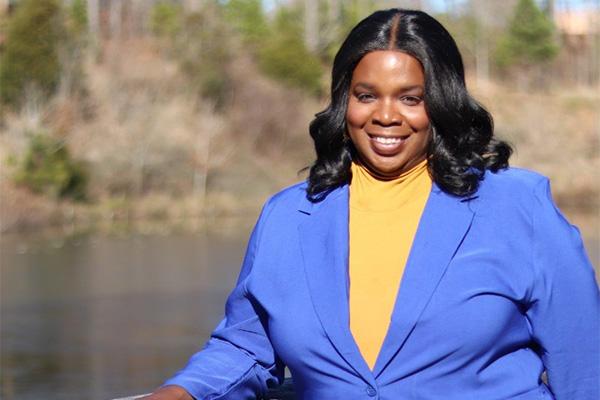
For Debra Ragland, PhD, who works closely with PhD students in the School of Medicine, addressing issues related to equity, diversity, and inclusion in the biosciences is simple. She says it’s a matter of creating a supportive environment where the students feel heard.
In this month’s EDI Spotlight, Ragland shares how in her role as director of the Duke BioCoRE Program, she helps students who are excited about the biosciences get the support they need as they work toward becoming the next generation of scientists. She explains how BioCoRE works to increase diversity by focusing on lived experience and blindly reviewing applications. We also learn what brings her joy outside of Duke: taking photos, shopping, and walking local trails with her son, JoJo, and dog, Woodstock.
What are your primary responsibilities as director of the Duke BioCoRE (Biosciences Collaborative for Research Engagement) Program?
The BioCoRE program has close to one hundred matriculating students ranging in years from 1-8. My job is to support their professional, scientific, and career development so they are prepared for life after Duke.
What does a typical day for you look like?
It really varies from one minute to the next. I could be working updating various applications or registration forms, to an advocacy meeting, to planning our next event or service opportunity with a student committee, to consulting with programs and departments about best practices for their students.
What do you enjoy most about your job?
The variety! I get bored easily, so I like roles that require different tasks from day to day.
When and how did you begin working to improve equity, diversity, and inclusion within Duke?
I started at Duke in March of 2022. I've been in the EDI realm since 2019 when I worked as a lecturer of biochemistry at Clemson, where I began a program to help underrepresented students navigate through our department. Afterward, I moved on to an assistant director position at UNC, and finally now at Duke where my role is similar but much more involved.
How is the BioCoRE Program currently working to address issues relating to equity, diversity, and inclusion?
I think the ways in which we address issues in EDI are rather simple. Our students know that they can come to MSRB III 1240, and that's a safe space for them. Their voices are heard. Their needs are met with action. And they have people in their corner at all times. In this way, we're constantly learning and adapting to issues as they arise because we generally use the same approach for all things.
Why is it important to increase diversity in the biosciences?
Diverse teams inherently have diversity of thought, which enriches the work done in the biosciences. Increasing diversity in the biosciences can only lead to more diverse perspectives centered around a common goal, which could help us find the answers that we're asking with our research questions at a much faster pace.
What kinds of initiatives has BioCoRE created to help address the need to increase diversity in the biosciences?
I personally try to shift the definition of diversity to center around lived experience and difference in perspective rather and racial or ethnic background. In this way, we are always learning from one another on what programming and opportunities to implement to meet the needs of students. Our application review process has been done blindly since I started so that we target those in need of community rather than those who fit a specific phenotype. The feedback in our annual survey is used to create more timely programming. We're teaching a course on equity in research. As much as we can, we garner participation from non-BioCoRE students for various events. The list goes on.
What kinds of events or programming do you offer to help support graduate students and postdocs in biomedical research while they train at Duke?
Our core events/programming is a long list but primarily includes our Early Start bridge program for incoming students, cohort meetings, happy hour chalk talks (with DUPA), our What Makes Me A Scientist seminar series, our BUILD-U soft skill series, the poster symposium, the 3-Minute Thesis Competition, monthly service opportunities, bi-annual publication of the newsletter, the annual retreat (generally offered for RCR credit), and the celebration of achievements to cap off the year. There's constant innovation happening throughout the year, so things get added to the list all the time. All of these things are only made possible via the help of the students on our leadership committees.
How is this support beneficial on their journeys to becoming scientists?
The students get to “choose their own adventure” as they like to say. They can pick an effort that aligns with their core values most and help to improve upon its current design. For instance, our students who are stellar at writing and communications can join the communications committee and theoretically have a portfolio of their work as they move on to medical writer positions (if they choose). Our students who believe in supporting mental health and wellbeing can join that committee and hopefully implement their knowledge in their future workplace. For students who don't have time work on a committee, they can come and learn from the scientists and professionals we invite monthly to the various workshops listed above.
What passions or hobbies do you have outside of work?
I like to take pictures with my DSLR. I'm a shopper (and I wish I wasn't) so I'm always browsing. I manage to make it to the gym quite often during the week. But I think my favorite thing to do is walk around the neighborhood or local trails with my 7-year-old dog and 8-year-old son, Woodstock and JoJo.